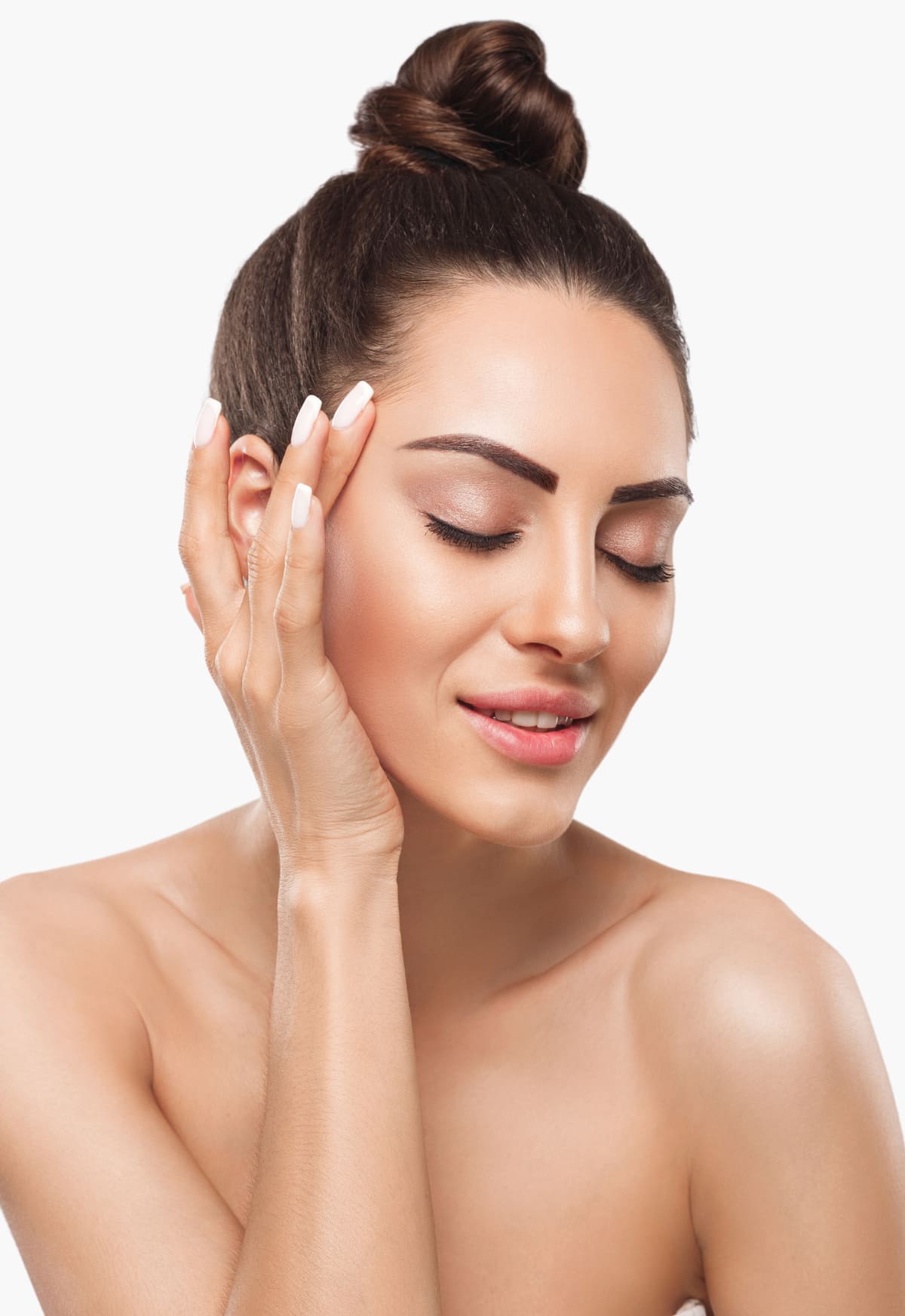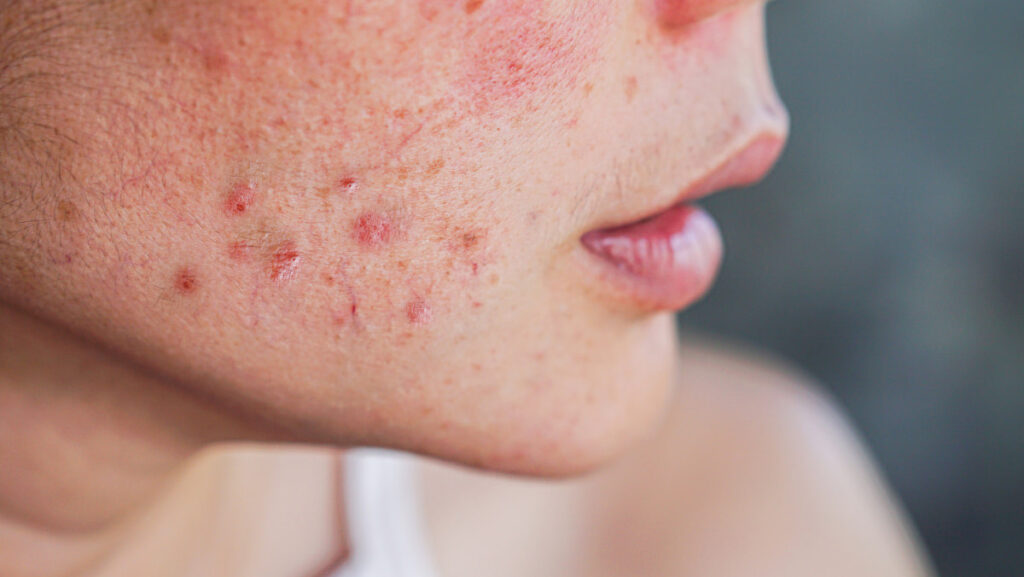
Have you ever wondered, “Can dry skin cause acne breakouts?” You’re definitely not alone in asking this question! Dry skin and acne often go hand in hand, so in this post, we’re diving into the relationship between these two common skin issues.
Dry skin occurs for all sorts of reasons, like genetics, cold weather, low humidity, and skin routines that strip away too much moisture. When it acts up, your skin may look flaky and feel tight, rough, or itchy. While you might think oily skin is the only culprit for acne, it’s important to understand how dryness could also play a role.
Your skin acts as a barrier to protect you from external elements and irritation. But when it’s dry, that barrier isn’t as strong. This leaves your skin more vulnerable to bacteria and inflammation – both of which can worsen acne. We’ll discuss some ways dryness may trigger breakouts and provide tips for managing both conditions at the same time.
By the end, you’ll have some helpful insights into caring for your skin when dryness and acne are issues. Let’s get started on our exploration!
Can Dry Skin Cause Acne?
This is a common question, so let’s explore it! While dry skin doesn’t directly cause acne, it can definitely make breakouts more likely under certain conditions. So yes, you can have acne at the same time as dry skin.
When your skin is dry, its protective barrier isn’t as strong. This leaves it more vulnerable to irritation, bacteria, and inflammation – all of which can worsen existing breakouts or even trigger new ones.
Dryness may also cause your skin to produce extra sebum (oil). While this aims to moisturize dry skin, too much sebum can clog your pores.
Additionally, dry skin can lead to a buildup of dead skincells on the surface. When these cells aren’t shed properly, they have a greater chance of blocking pores.
The skin may also overcompensate for dryness by producing more sebum. The extra oil glands working overtime increases the risk of clogged pores and pimples. Some research[1] has even found a link between low-humidity environments, which dry out skin, and higher rates of acne.
So, while dryness alone may not directly induce acne in most cases, it can definitely aggravate existing breakouts or set the stage for future ones. Proper moisturization is key to keeping skin healthy and breakout-free!

Factors That Link Dry Skin To Acne
Now, you’re probably wondering what could possibly cause this dehydrated skin, leading to unwanted breakouts. Here are a few culprits:
- Harsh skincare products: Some facial cleansers or makeup products strip away natural oils from your face, leaving it too dry.
- (Extreme) Weather conditions: Your environment plays a huge role in causing dryness, leading to potential acne. Exposure to harsh weather conditions like wind or cold can make your skin lose its natural oils faster than it should, leaving it vulnerable.
- Dry air: During the winter, the air tends to be drier (like we said above), but we obviously turn our heater on, which also causes dry air – eventually, this also draws moisture from our skin.
- Over-exfoliation: Yes, exfoliation helps remove dead cells, but overdoing it irritates the skin, causing it to become overly dried out.
- Acne treatments: Huh? These are supposed to fight acne, right? Yes, but acne treatments, such as benzoyl peroxide and salicylic acid, can also dry your skin. Many common anti-acne ingredients cause dryness.
- Genetics: It turns out that genetics do play their part, too, when it comes down to having dry skin and acne. If your parents had similar issues, chances are, you might have inherited them too. Thanks, mom and/or dad!
Each one of these factors plays a role in disrupting the natural balance of oil on our faces, which then kickstarts that domino effect into breakout territory.
Skincare For Dry Acne Prone Skin
Managing both dryness and acne can feel like a delicate balancing act. Using the right products and techniques is key to moisturizing skin without triggering breakouts. The following four-step routine focuses on gentle cleansing, mild exfoliation, deep moisturization, and targeted treatment.
When done consistently, it can help soothe dry patches while also preventing pores from clogging up due to dry skin’s increased sebum production. Let’s break down each step and how implementing it can benefit your complexion.
Step 1: Cleanse Gently
When skin is dry and acne-prone, it’s important to cleanse gently without stripping moisture. Opt for a creamy, hydrating cleanser made for sensitive skin.
Look for ingredients like ceramides, glycerin, and hyaluronic acid. Gently massage in circular motions, wash your face thoroughly and rinse to remove dirt and excess oil while retaining moisture. Here are my favorite gentle yet hydrating cleansers:
- The Inkey List Oat Cleansing Balm
- Fresh Soy Face Cleanser
- CeraVe Hydrating Facial Cleanser
- The Inkey List Hyaluronic Acid Cleanser
Step 2: Exfoliate Delicately
Exfoliating 1-2 times a week can help slough off dead skin cells and prevent pores from clogging. Choose a soft acid like lactic acid for dry, acne-prone skin. Harsh scrubs may irritate the skin further.
- Fresh Sugar Strawberry Exfoliating Face Wash
- The Ordinary Lactic Acid 10% + HA
- Paula’s Choice 10% Azelaic Acid Booster
- FaceTheory Porebright Serum N10
Step 3: Moisturize Deeply
Apply an oil-free, non-comedogenic moisturizer after cleansing and exfoliating. Look for humectants like glycerin or hyaluronic acid to draw moisture into the skin. I’ve found some of the best hydrating serums that dry skin types will love.
Ceramides and peptides also help strengthen skin barrier function. Moisturizing prevents excess sebum production associated with dryness. Here are a few of my personal favorite moisturizing products:
- rhode skin glazing milk
- The Inkey List Hyaluronic Acid Serum
- Alpha- H Hyaluronic 8
- Caudalie Vinosource Hydra S.O.S Thirst-Quenching Serum
- rhode skin barrier restore cream
Step 4: Treat Breakouts
Target acne gently with spot treatments containing 2% salicylic acid or benzoyl peroxide. Apply only to problem areas as needed. For severe acne, see a board certified dermatologist. Here a the acne treatments I love to use:
- Mario Badescu Drying Lotion
- Kylie Skin Clear Complexion Correction Stick
- Zitsticka Killa Deep Zit Microdart Pimple Patch
DIY Skincare For Dry Skin
Looking for some DIY solutions? Or maybe you don’t have time to go to the store right now but need a solution ASAP. Here are some options if your skin lacks moisture:
- Tea Tree Oil: Tea tree oil has natural antibacterial and anti-inflammatory properties. It can be applied topically to acne-prone areas, but it should be diluted with a carrier oil (such as jojoba oil or coconut oil) to prevent skin irritation. Avoid using it undiluted.
- Honey: Honey is known for its antibacterial and wound-healing properties. Applying a thin layer of raw, organic honey to acne-prone areas can help soothe inflammation and promote healing. Leave it on for 10-15 minutes before rinsing.
- Aloe Vera: Aloe vera gel is a natural moisturizer with anti-inflammatory properties. It can help soothe irritated skin and reduce redness associated with acne. Apply a thin layer of pure aloe vera gel to your face as a moisturizer or spot treatment.
- Witch Hazel: Witch hazel is a natural astringent with anti-inflammatory properties. It can help reduce inflammation and remove excess oil from the skin. Use a witch hazel toner after cleansing your face.
- Turmeric: Turmeric contains curcumin, which has anti-inflammatory and antibacterial properties. You can create a paste by mixing turmeric powder with water or honey and applying it as a mask for 10-15 minutes.
- Apple Cider Vinegar: Apple cider vinegar is mildly acidic and can help balance the skin’s pH levels. It also has bacteria-fighting properties. Dilute it with water (1 part vinegar to 3 parts water) and use it as a toner, gradually increasing the dilution if needed.
- Jojoba Oil: Jojoba oil is similar to the skin’s natural sebum, making it an excellent moisturizer for acne-prone skin. Applying a few drops of jojoba oil to your face as a moisturizer can help maintain skin balance.

Conclusion: Balancing Your Skincare Routine
So, you’ve made it to the end of this journey, and now we’re going to wrap things up. You might be wondering if dry skin can indeed cause acne? The answer is yes, but it’s a bit more complex than that.
Dry skin isn’t typically the root cause of acne. Instead, it’s often the side effects of dry skin – like irritation and overcompensation in oil production – that lead to those dreaded breakouts.
Think about how you’ve been treating your skin lately. Have you been too harsh? Maybe not giving it enough moisture?
A balanced skincare routine is key here. It shouldn’t just focus on eliminating oil or hydrating your parched pores – instead, strive for a regimen that does both! Here are some tips:
- Always keep hydration at heart: Opt for moisturizers with ingredients like hyaluronic acid and glycerin.
- Exfoliate gently: Overdoing exfoliation can damage your skin barrier, leading to more problems.
- Don’t skip sunscreen: UV rays can exacerbate any existing issues, so don’t skimp out on daily sun protection.
Remember, there’s no one-size-fits-all solution when dealing with something as personal as your complexion. Take time exploring options and consult professionals if needed.
Listen closely to what your unique dermal layers are telling you because they hold clues about what they need most.
We hope this guide has shed light on some misconceptions surrounding dry skin causing acne while offering useful tips to balance your skincare routine. Remember, it’s all about treating your skin kindly and finding what works best for you!
Frequently Asked Questions
shop the post
